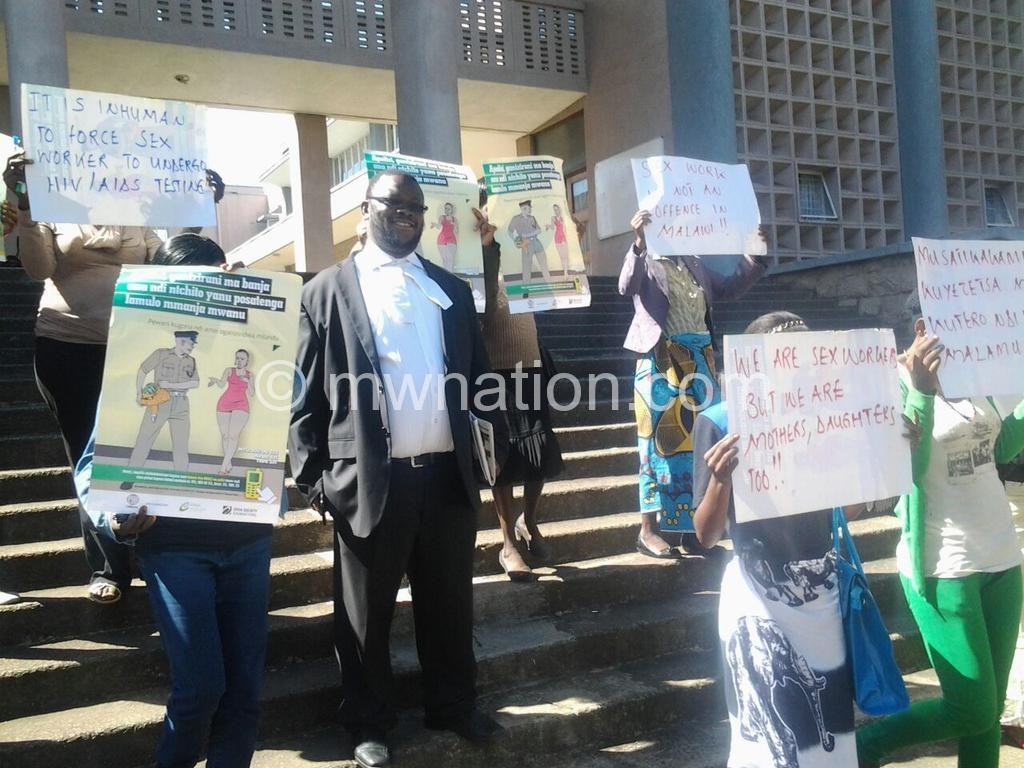Malawi sex workers win forced HIV test case
The High Court in Blantyre yesterday ruled in favour of 11 sex workers who were subjected to a mandatory HIV test in Malawi’s southern district of Mwanza in 2011.
The court has ordered that the women should be compensated.
The 11 were taken for the forced HIV test after being arrested on two separate occasions in September and November 2009 during sweeping exercises conducted by police in the district.
In her judgement, High Court judge Dorothy Kamanga said the officer-in-charge (OC) of Mwanza Police Station and the Mwanza District Health Office were irrational, unjust and unfair in the actions which she described as unreasonable.
![Sex workers displaying placards outside the High Court in Blantyre yesterday [Tuesday]](http://mwnation.com/wp-content/uploads/2015/05/sex-workers-1-1024x768.jpg)
The judge also faulted the Mwanza First Grade Magistrate’s Court which convicted the women on the charge of negligently exposing people to sexually transmitted infections (STIs) such as HIV and Aids, for accepting as evidence results of the HIV test without the consent of the offenders as well as to disclose publicly the women’s HIV status.
Kamanga, who said there is a need for review to ascertain methods under which evidence was obtained as well as how proceedings were conducted in the lower court, also observed that the magistrate should have asked for consent before public disclosure.
In an interview after the ruling, senior State advocate Madalitso Kausi said: “I cannot say what will be the State’s next action as there is need to revisit the judgement again and decide from there.”
However, a lawyer representing the sex workers, Chrispine Sibande, said in an interview he was happy with the decision which was a landmark in as far as issues of HIV and Aids are concerned.
Said Sibande: “The DHO and the police infringed on the privacy and the rights of the women. They contravened fundamental human rights and it is a good thing the court has set that straight.
“This judgment is a big contribution to Malawi as it will give parliament guidelines on how to deal with issues to do with mandatory HIV test when members will be discussing the HIV Management Bill.”
He said he was hopeful this will be discussed at international level by organisations such as UNAids and World Health Organisation (WHO) as it provides a basis of how human rights for sex workers should be respected.
Commenting on the ruling, the Centre for Human Rights Education, Advice and Assistance (Chreaa), which had an interest in the case, said the organisation is happy with the judgement as it would act as a precedent to other would-be offenders who contravene human rights of offenders.

The women were later taken to the district hospital where they were subjected to a mandatory HIV testing without their consent. The testing was done in the presence of the police.
The medical officers who were conducting the test wrote the women’s names and test results on pieces of paper and handed them to the police.
Thereafter, the women were taken to the magistrate’s court where some were charged with spreading venereal diseases in contravention of Section 192 of the Penal Code.
In March 2011, the 11 filed an application in the High Court seeking a judicial review challenging their subjection to mandatory HIV tests, the admission of the HIV test results as evidence in criminal cases against them and the public disclosure of their HIV status in an open court.





